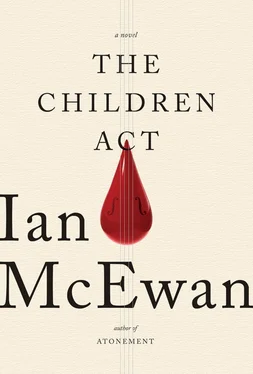Kevin Henry paused to think. For the first time he looked back at his wife. “If you spent five minutes in his company you’d realize he’s someone who knows what he’s about and is able to make a decision according to his faith.”
“I rather think we’d find a terrified and seriously ill boy desperate for the approval of his parents. Mr. Henry, have you told Adam that he’s free to have a transfusion if he so wishes? And that you’d still love him?”
“I’ve told him that I love him.”
“Only that?”
“It’s enough.”
“Do you know when Jehovah’s Witnesses were commanded to refuse blood transfusions?”
“It’s set down in Genesis. It dates from the Creation.”
“It dates from 1945, Mr. Henry. Before then it was perfectly acceptable. Are you happy with a situation in which in modern times a committee in Brooklyn has decided your son’s fate?”
Kevin Henry lowered his voice, out of respect for the subject matter perhaps, or in the face of a difficult matter. Again he included Fiona in his answer, and there was warmth in his voice. “The Holy Spirit guides the anointed representatives—we call them the slaves, Your Honor—it helps them toward deep truths that weren’t previously understood.” He turned back to Berner and said matter-of-factly, “The Governing Body is Jehovah’s channel of communication to us. It’s his voice. If there are changes in the teaching it’s because God only gradually reveals his purpose.”
“This voice doesn’t tolerate much dissent. It says here in this copy of The Watchtower that independent thinking was promoted by Satan at the beginning of his rebellion in October 1914 and such thinking should be avoided by followers. Is this what you’re telling Adam, Mr. Henry? That he must watch out for Satan’s influence?”
“We like to avoid dissent and quarrels and keep ourselves unified.” Mr. Henry’s confidence was growing. He appeared to address the barrister privately. “You probably have no idea what it is to submit to a higher authority. You need to understand that we do so of our own free will.”
There was a trace of a lopsided smile on Mark Berner’s face. Admiration for his adversary, perhaps. “You’ve just told my learned colleague that in your twenties your life was a mess. You said you were a bit of a wild man. Hardly likely, is it, Mr. Henry, that several years earlier, when you were Adam’s age, you knew your own mind.”
“He’s lived his whole life in the truth. I didn’t have that privilege.”
“And then, as I recall, you said you discovered that life was precious. Did you mean other people’s lives or just your own?”
“All life is the gift of the Lord. And his to take away.”
“Easy to say, Mr. Henry, when it’s not your life.”
“Harder to say when it’s your own son.”
“Adam writes poetry. Do you approve of that?”
“I don’t think it’s particularly relevant to his life.”
“You’ve rowed with him about it, haven’t you?”
“We’ve had serious conversations.”
“Is masturbation a sin, Mr. Henry?”
“Yes.”
“And abortion? Homosexuality?”
“Yes.”
“And this is what Adam has been taught to believe?”
“It’s what he knows to be true.”
“Thank you, Mr. Henry.”
John Tovey rose and, somewhat breathlessly, told Fiona that given the hour he had no questions to ask of Mr. Henry, but he would call the social worker, the Cafcass officer. Marina Greene was slight, sandy-haired and spoke in short precise sentences. Helpful, at this stage of the afternoon. Adam, she said, was highly intelligent. He knew his Bible. He knew the arguments. He said he was prepared to die for his faith.
He had said the following—and here, with the judge’s permission, Marina Greene read from her notebook. “I’m my own man. I’m separate from my parents. Whatever my parents’ ideas are, I’m deciding for myself.”
Fiona asked what action Mrs. Greene thought the court should take. She said her view was simple, and she apologized for not knowing every turn of the law. The lad was clever and articulate, but still very young. “A child shouldn’t go killing himself for the sake of religion.”
Both Berner and Grieve declined to cross-examine.
BEFORE HEARING CLOSING submissions Fiona allowed a short break. The court rose and she went quickly to her room, drank a glass of water at her desk and checked her e-mails and texts. Plenty of both, but nothing from Jack. She searched again. It wasn’t sadness or anger she felt now, but a dark hollowing-out, an emptiness falling away behind her, threatening to annihilate her past. Another phase. It didn’t seem possible that the person she knew most intimately could be so cruel.
It was a relief, several minutes later, to be back in court. When Berner rose it was inevitable that he should move the argument to “Gillick competence”—a point of reference in both family law and pediatrics. Lord Scarman had provided the formulation, and the barrister quoted him now. A child, that is, a person under sixteen, may consent to his or her own medical treatment “if and when the child achieves sufficient understanding and intelligence to understand fully what is proposed.” If Berner, in advancing the hospital’s case to treat Adam Henry against his wishes, was invoking Gillick now, it was to preempt Grieve from doing so on behalf of the parents. Get in first and shape the terms. He did so in quick short sentences, his smooth tenor’s voice as clear and precise as it was when he sang Goethe’s tragic poem.
It was a given, Berner said, that not transfusing was of itself a form of treatment. None of the staff looking after Adam doubted his cleverness, his extraordinary way with words, his curiosity and passion for reading. He had won a poetry competition run by a serious national newspaper. He could recite a long part of an ode by Horace. He was truly an exceptional child. The court had heard the consultant confirm that here was an intelligent and articulate boy. Crucially, however, the doctor had just confirmed that Adam had only the vaguest notion of what would happen if he did not receive blood. He had a general, somewhat romantic idea of the death that awaited him. Therefore he could not be said to fulfill the terms as set out by Lord Scarman. Adam most certainly did not “understand fully what is proposed.” Quite rightly, the medical staff would not want to explain it to him. The senior health professional was in the best position to judge, and his conclusion was clear. Adam was not Gillick competent. Second, even if he was, and therefore had the right to assent to treatment, this was very different from the right to refuse life-saving treatment. On this the law was clear. He had no autonomy in the matter until he was eighteen.
Third, it was plain, Berner continued, that the risks of infection following transfusion were minimal. Whereas the consequences of not transfusing were certain and horrific, probably fatal. And fourth, it was no coincidence that Adam happened to have the same particular faith as his parents. He was a loving and devoted son who had grown up in the atmosphere of their sincere and strongly held beliefs. His highly unconventional views concerning blood products, as the doctor had forcefully suggested, were not his own. All of us, surely, had beliefs at the age of seventeen that would embarrass us now.
Berner summarized at speed. Adam was not eighteen, did not understand the ordeal that lay ahead of him if he was not transfused, had been unduly influenced by the particular sect he had grown up in and was aware of the negative consequences should he defect. The views of Jehovah’s Witnesses lay far outside those of a modern, reasonable parent.
As Mark Berner turned to sit down, Leslie Grieve was already on his feet. In his opening remarks, which he addressed a few feet to Fiona’s left, he too wished to direct her attention to a pronouncement of Lord Scarman’s. “The existence of the patient’s right to make his own decision may be seen as a basic human right, protected by the common law.” This court should therefore be extremely reluctant to interfere in a decision regarding medical treatment made by a person of evident intelligence and insight. It was plainly not enough to take shelter behind the two or three months that separated Adam from his eighteenth birthday. In a matter so gravely affecting an individual’s basic human right, it was inappropriate to resort to number magic. This patient, who had repeatedly and consistently made his wishes clear, was far, far closer to being an eighteen-year-old than he was to being seventeen.
Читать дальше












